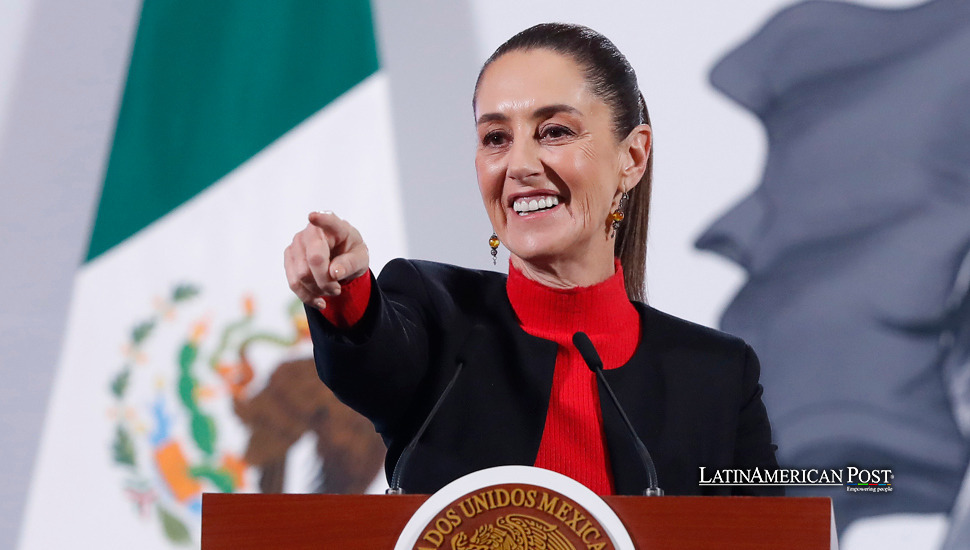Latin Nations Should Support Mexico’s America as Entire Continent’s Identity Stance

Mexico’s President Claudia Sheinbaum has sparked a lively debate by saying that “America” belongs to all countries on the continent, not just the United States. Her words question old naming habits ‒ starting a new talk about who holds the right to define “America.”
The Historical Roots of “America” and Mexico’s Retort
In a public swipe against Donald Trump’s plan to rename the Gulf of Mexico the “Gulf of America,” President Claudia Sheinbaum showcased a 1607 map labeling North America as “América Mexicana.” Playfully proposing that the entire continent could be called “Mexican America,” Sheinbaum illustrated that Mexico, too, can deploy historical references to claim “America.”
Her stance draws on a broader tradition in which Latin American intellectuals have long insisted that “América” is not the exclusive property of the United States. In many Spanish-speaking regions, “América” can refer to the entire western hemisphere, a concept reinforced by old maps, colonial archives, and cultural texts. Sheinbaum’s quip thus critiques the common assumption that “America” defaults to the United States alone, underscoring a historical truth: from the 16th to the 19th century, the term “America” was used in multiple ways, including references to “New Spain,” “Portuguese America,” and other variant denominations.
Her comments specifically rebuff Trump, who wants to turn the centuries-old “Gulf of Mexico” into “the Gulf of America.” Trump’s move, echoing colonial renaming practices, triggered Sheinbaum’s response that “Mexican America” might be just as valid. Although her tone was light, the subtext is serious. By evoking a map from 1607, Sheinbaum suggests that naming rights aren’t the sole privilege of modern U.S. leadership. Instead, she highlights Mexico’s own historical continuity with the term “America” and questions whether the U.S. can unilaterally rebrand centuries of shared geography.
This rhetorical clash can’t be divorced from the broader friction between the newly re-elected Trump and Mexico’s first female president. Trump’s vow to impose a 25 percent tariff on Mexican imports and his plan to deport undocumented migrants to Mexico—regardless of their nationality—have raised cross-border tensions. Sheinbaum indicated she may reciprocate with matching tariffs and insist on partial compensation if Mexico ends up hosting large numbers of deportees. While the naming debate might sound trivial, it reflects a deeper power struggle over who shapes public narratives about the hemisphere.
Trump’s Renaming Crusade and Symbolic Power
Donald Trump likes to give new names to places or policies ‒ this is well-known. From “build the wall” to creating new acronyms for government programs, he often uses naming to show power. “the Gulf of America” is another way he tries to excite his supporters with national pride. MAGA supporters quickly rallied behind the idea, with lawmakers like Marjorie Taylor Greene drafting a bill to codify the new label.
Critics point out that forcibly renaming internationally recognized bodies of water is reminiscent of imperial or colonial practices. It simplifies complex histories to a convenient marketing handle, overshadowing the fact that Mexico shares this gulf—and has for centuries. Linguistically, Trump’s push treats “America” as if it belonged to the United States alone. But Sheinbaum’s counterpoint—that Mexico can rename North America itself—exposes the irony: naming is often an exercise of raw power, not of consensus.
Renaming large geographic features can reinforce or invent a sense of ownership. By the same logic, Sheinbaum, brandishing her old map, implies that if Trump can propose “Gulf of America,” Mexico can propose “América Mexicana.” In practice, neither renaming effort will likely stick on international charts or maps. But the rhetorical move underscores a key question: Who controls the symbolic identity of the hemisphere? If language can direct people to see the region as “belonging” to the U.S., it can equally highlight that Mexico (and other Latin nations) have their own foundational claims.
Sheinbaum’s style feels partly playful ‒ yet it shows steady resistance to Trump’s one sided talk. She has vowed to work with Trump’s team on things like safety and trade ‒ “without giving up Mexico’s independence.” Her joking about “Mexican America” underscores the principle that naming—and thus, symbolic dominion—cannot be unilaterally dictated from Washington. If the U.S. can rename a gulf, Mexico can rename a continent, at least in jest, pointing to the fluid nature of such claims.
Reasserting “America” for All: Cultural and Diplomatic Dimensions
Sheinbaum’s call to see America as broader than the United States resonates with many in Latin America who resent the exclusive appropriation of “America” for “American.” The concept that “we’re all Americans,” from Canada’s Nunavut to Chile’s Patagonia, has deep cultural resonance. Historical figures like Simón Bolívar or José Martí described a unified “American” identity spanning multiple nations, a notion overshadowed by the U.S.’s growing global influence in the 20th century.
Even within Latin America, usage differs: in Spanish, “América” can mean the entire hemisphere; “Estados Unidos” is typically used to specify the United States. In English, “America” has solidified as the U.S. alone. Many Latin Americans bristle at the reductive assumption that “American” must refer solely to people from the United States. Sheinbaum’s mention of an old map, labeling the land as “América Mexicana,” underscores how fluid these definitions once were—and potentially could be again.
When Sheinbaum’s comment ignites wider thinking, it probably helps bring back a pan continental identity. Urging everyone to view “America” as a mix of cultures may just encourage teamwork across borders ‒ from climate projects to economic partnerships. Currently, continental unity is fragmented; the U.S., Canada, and Mexico have forged NAFTA (now USMCA), but further south, countries have different alliances like Mercosur. A unified rhetorical stance—emphasizing that “America” extends beyond the Rio Grande—could help unify policy agendas, especially as populist or nationalist forces threaten regional solidarity.
Opponents might claim Sheinbaum’s stance is unrealistic or rhetorical grandstanding. They note real disparities in political power, economic might, and historical context that hamper a neat, shared “American” identity. Yet small rhetorical shifts can accumulate. If national leaders continue highlighting that “America” is broader than one nation, popular consciousness might adapt, pressing the United States to acknowledge it doesn’t own the term exclusively. That shift in perspective, in turn, can open new channels for diplomacy: from renegotiating trade to addressing migration with an emphasis on mutual respect for each country’s claim to “America.”
A Path to Common Ground or Escalating Rhetorical Conflict?
As comedic as Sheinbaum’s comments about “Mexican America” sound, there’s a serious undercurrent. By refusing to let the term “America” default to U.S. usage, she’s leveling the playing field rhetorically. Just as Trump stokes pride by claiming the gulf, Sheinbaum re-centers Mexico’s historical presence on the continent. This back-and-forth shows how naming fights reflect deeper struggles over trade, border rules and cultural independence.
In the end the question stays ‒ do these naming fights make divisions stronger or shift the two countries toward working together on “America”? At 62, started as a climate scientist and now works in politics focusing on left side ideas and caring for the environment. 78, shows a populist style with a strong nationalist focus. Both have very strong support at home and neither seems willing to give up on their words. The chance of bringing their clashing ideas about “America” together might look very small. Yet ironically, if both leaders keep referencing “America” in broader contexts—Trump for grandeur, Sheinbaum for inclusivity—they may, however unwillingly, push a debate about the term’s rightful scope.
Future teamwork or fighting also depends on more clear factors: Trump’s threatened taxes, Sheinbaum’s promise of revenge, the situation of asylum seekers pushed into Mexico and the ongoing fight against cartels. Naming arguments hold symbolic power that can shape public thoughts and media stories. If enough Mexicans strongly support Sheinbaum’s belief that “América” belongs to them too, it might give her courage to resist Trump’s naming or policy changes. On the other hand if U.S. lawmakers quickly approve the “Gulf of America” bill, it could show strong disregard for Mexico’s view setting up deeper conflict.
Critics might laugh at the notion of dueling monikers—“Gulf of America” vs. “América Mexicana.” But such tussles over language are intimately tied to identity and power. Historically, controlling a name often preludes controlling a place or narrative. Sheinbaum’s retort isn’t petty; it’s a strategic push to keep Mexico relevant in a conversation the U.S. often dominates. If nothing else, it compels the global audience to reevaluate the default assumption that “America” is just the U.S. For those who champion a more unified, equitable hemisphere, Sheinbaum’s comedic idea might spark real shifts in discourse.
Although predictions vary, one plausible outcome is that the rhetorical friction remains high. Sheinbaum might continue referencing “Mexican America” as a playful counterweight each time Trump floats new naming proposals. This tension could even spill into official foreign policy statements. Diplomatic summits could see Mexico’s delegates quietly distributing maps labeled “América Mexicana,” fueling discussion among other Latin American nations who share a desire to reclaim “America.” Or, if cooler heads prevail, the two governments might downplay the naming row, focusing on urgent mutual concerns. But Sheinbaum’s stance will stand as an assertive statement of Mexico’s right to define “America” in a manner that includes, rather than excludes, its own identity.
Also Read: Mexico Braces for Tense Relations as Trump Eyes Military Moves
In the end, words do matter. They shape how people think about sovereignty, geography, and heritage. Trump’s gambit to rename the gulf sparks fervor among supporters who want to assert U.S. dominance. Yet Sheinbaum’s comedic map-based reply underscores that Mexico—indeed, all of Latin America—can harness the name “America,” too. It’s a clarion call reminding us that a hemisphere of nations share the label, that “America” extends beyond one country’s borders. And in a global arena rife with divisions, that broader perspective might be exactly what the region needs.





